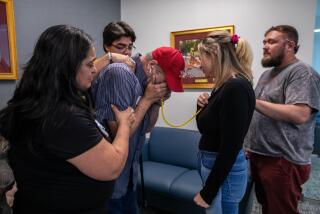Making A Difference in Your Community : Bone Marrow Donor’s Gift Saves a Life
- Share via
Few gestures exemplify the spirit of volunteerism as fundamentally as donating bone marrow to someone suffering from leukemia. It takes time, blood tests, a hospital stay and the pain and risk of undergoing a surgical procedure.
An employee of the accounts payable department at Magic Mountain, Deborah Arias, 35, of Santa Clarita, answered the call in 1987 when the president of Magic Mountain sponsored employee blood testing at the theme park to find a match for a young girl suffering from leukemia who needed a marrow transplant.
“They didn’t find a match and the girl ended up dying,” Arias said. “But that’s how my name ended up on the National (Marrow Donor Program) Registry.”
The registry lists the names of 870,000 potential donors.
About two years ago, Arias was asked to give more blood for a “second-stage” test, which involves a more in-depth examination of blood components to determine donor-recipient compatibility. A short time later, Arias was asked to come into the American Red Cross office in Van Nuys for a “third-stage” test to see if her blood components matched those of a leukemia patient in her 40s with a husband and two children. Six of the six components tested were identical.
“It was like a perfect match,” said Arias, who explained that the donor and recipient know very little about one another except for very general details. One year after the donation, the two can meet, if both parties agree.
After a consultation with a doctor who explained the procedure and the risks involved, which are primarily related to the use of general anesthesia, Arias was asked if she still wanted to go through with the donation.
“I could have backed out at any time,” she said.
Upon passing the final obstacle, a physical examination, Arias was ready to donate her bone marrow.
Ten days before the donation, all of the recipient’s bad bone marrow was removed in preparation for the transplant.
Although the procedure takes only three to four hours, Arias checked into Harbor-UCLA Medical Center the night before the procedure for a two-night stay--the second night being for observation.
Two doctors perform the procedure, each drawing marrow at the same time. The extracted marrow is then purified and flown to the recipient.
Arias said she was more interested and excited about the whole process than scared.
The pain, which she felt when she sat down or got up, lasted about a week or two, Arias said. After a month, she was back on the tennis court, completely recovered.
Donors can give marrow more than once, and Arias says she would definitely do it again.
Arias incurred no expense while being tested and donating marrow. Initial testing costs are typically borne by sponsoring organizations or businesses or by the Red Cross through a grant from the National Institutes of Health, said Barbara Wilks, spokeswoman for the Red Cross Blood & Tissue Services Southern California Region. The actual marrow transplant costs are borne by the patient or their insurance carrier.
About 16,000 adults and children in the United States are stricken each year with leukemia and other blood-related diseases that can be treated with a transplant of bone marrow from a compatible donor, Wilks said. Marrow transplants increase the odds of long-term survival from less than 20% to between 45% and 80%, she said.
Although a patient’s family members are the first ones sought as donors, compatible matches are found only 30% of the time.
“The anonymous donors make a really big commitment,” Wilks said. “They do this for someone they may never meet or never know, but they help save lives.”
For more information on volunteering to be a potential bone marrow donor call the Red Cross at (818) 376-1762 or (213) 739-4594.
Getting Involved is a weekly listing of volunteering opportunities. Please address prospective listings to Getting Involved, Los Angeles Times, 20000 Prairie St., Chatsworth, 91311. Or fax them to (818) 772-3338).


